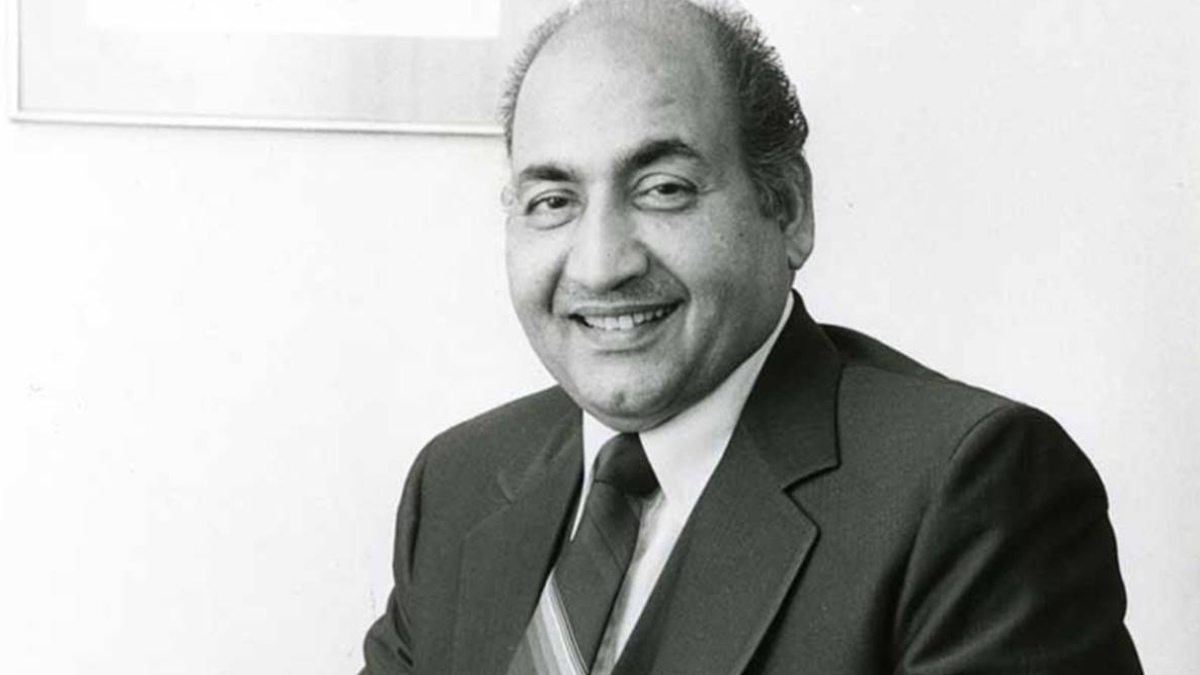


On Monday, it shall be 43 years since Mohammad Rafi, arguably the greatest male playback singer, passed away. However, his songs, continue to enthrall listeners throughout the country in every Radio programme. If Lata Mangeskar was the Malika-e-Mausiki (Empress of Music), Rafi was the Badshah. His innumerable fans have been urging successive governments to confer the Bharat Ratna on this gifted singer, whose magical was distinct in every respect, and it is not surprising that no one has been able to replicate it in any manner. There are clones of virtually every singer we have had, but none has been able to sing with the same ease and fluency as Rafi did, during his nearly four decades singing career, which began with a Punjab song. Rafi’s versatility was unmatched and the manner in which he adapted his singing style to suit the Heroes, he lent his voice to, made it so easy for the listeners to identify them. There was not an actor of his era, big or small, who while making his mark on the silver screen, did not acknowledge the contribution of the extraordinary singer. What many music fans may not be aware of is that Rafi even lent his voice to Kishore Kumar, another legend who started his career as a singer actor in the 1950s. In the seventies and early eighties, Kishore Kumar mesmerized listeners with his vocal achievements. He, however, did acknowledge that he was a great Rafi fan as well. In the film, Raagini, for which OP Nayyar provided the music, Rafi sang a classical number, “Man Mora Bawara’’ which was picturized on Kishore Kumar. Similarly, in “Shararat, Rafi sang, “Ajab Hai Dastaan teri ai Zindagi’ for Kishore Kumar, who was the Hero. Kundan Lal Saigal, was regarded as one of the most phenomenal singers of his times, and his passing away in 1948 left a big void so far as male singing was concerned. There were multiple claimants for the top position and Talat Mehmood, a very gifted singer shot ahead of others and was virtually the number one crooner for some time. The story is that he decided to go on a Haj pilgrimage which used to take nearly three months, since devotees would travel by Ship to Saudi Arabia. However, the three months absence proved very costly, as music composers decided to completely put their entire weight behind the upcoming Rafi. There were several songs where Rafi’s voice had impressed music maestros but his popularity soared when he rendered “Suno Suno O Duniyawalon Bapu ki yeh Amar Kahani’’, after the assassination of Mahatma Gandhi. The song made him a household name and simultaneously, two songs, “Yeh Zindagi ke Mele Duniya mein kum na Honge’’ under the baton of Naushad and “Mein Zindagi mein hardum Rota hi Raha hoon’ for Shankar Jaikishen for their maiden film, Barsaat became super hits. There was no looking back and Rafi’s magical journey had begun. Rafi became the preferred singer for Dilip Kumar despite the fact that Talat Mehmood had greater similarity with the actor’s voice. Naushad who was amongst the top composers, and provided musical score for many of Dilip Kumar’s movies, found Rafi’s versatility more suitable for his compositions, which included his score for films not starring Dilip Kumar but also actors such as Bharat Bhushan and his “Baiju Bawra’’. What also worked to Rafi’s advantage was that Raj Kapoor settled for Mukesh as his main playback singer because of their personal friendship, even though the voice of Manna Dey, a very versatile and gifted singer in his own right, closely resembled that of the great showman. This was reflected in many songs where Shankar Jaikishen, the number one composers of that time, recorded songs in Manna Dey’s voice for being filmed on Raj Kapoor including the memorable duets in Chori Chori and Shri 420. Rafi sang for Dev Anand as well, who also had Kishore Kumar, his close friend rendering his voice for many of his hit songs. Dev Anand once told me that he always preferred Rafi for the Ghazals and Kishore Kumar for lighter songs. Nevertheless, Rafi also sang many romantic songs picturized on Dev Anand including “Abhi Na Jao Chhod kar, ke dil abhi bhara nahin’’, for Hum Dono. Shammi Kapoor the rebel star owed much of his success to the image transformation he had from a flop actor to an icon, thanks to Rafi’s voice and Shankar Jaikishen and OP Nayyar’s music. The “Yahoo’’ song was the defining moment when Junglee was released. Jubilee Star Rajendra Kumar was another who benefitted enormously from the golden voice. Johnny Walker, the famous comedian also entertained fans by lending his lips to Rafi’s songs. There are multiple functions that are planned for his anniversary as always, and Binoo Nair in Mumbai has once again taken the lead. His many fans who have been demanding that the government should confer the Bharat Ratna on the singer, too have been circulating English songs sung by Rafi. Many of them are not aware that Rafi had in the 1960s cut a single on a 45 RPM disc with two of his popular numbers in English. One was based on “Baharo Phool Barsao, Mera Mehboob Aaya Hai’’ for the film, Suraj and other on “Hum Kale hain to Kya Hua Dil Wale Hain’’ from Gumnaam. In this day and age when youngsters are emerging from the shadows to make a mark, music lovers can never forget the likes of Rafi, Lata, Hemant Kumar, Kishore Kumar, Manna Dey, Mukesh, Mahendra Kapoor, Shamshad Begum, Noor Jahan, Asha Bhonsle and many others. The fact that Rafi lives on even beyond his death, is the greatest tribute to his legendary status as a singer.